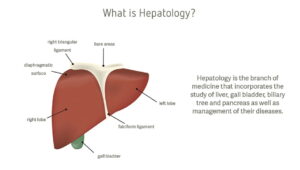What is Hepatology
It is a field of liver disease. The liver is the largest organ in the human body and hepatology is a large field. It includes the study of acute and chronic hepatitis, viral hepatitis, cirrhosis, genetic and metabolic liver diseases and their complications, liver cancer, liver transplantation, drug metabolism, and immunology as it is related to the liver.
Historically, hepatology emerged out of gastroenterology and so became a subfield of it gradually, although today it appears to be emerging as a freestanding medical specialty. The hepato- part comes from the Latin hepaticus derived from the Greek hepatikos meaning (not too surprisingly) the liver. The -logy part comes from the Greek logos meaning the study of, or field.

History:
Dr. Sheila Sherlock (1918-2001), was a pioneer in the science of liver disease, and she is considered as the “mother of hepatology.” Her book, “Diseases of the Liver and Biliary System” which was first published in 1955, was the first textbook on clinical liver disease.
Hepatitis affects millions of people globally and is associated with several poor outcomes including liver transplant and liver cancer. Hepatitis B and Hepatitis C are major causes of liver cancer, nowadays while alcohol abuse has been linked to conditions such as cirrhosis and other serious complications. Hepatologists deal with mostly viral hepatitis and alcohol-related liver disease.
Most common ailments that are assessed, diagnosed and managed by a hepatologist include:
- Diseases of the liver which are related to excess alcohol consumption, including fatty liver disease, liver cirrhosis and liver cancer.
- Viral hepatitis infections (hepatitis A, B, C and E).
- Drug overdose
- Jaundice
- Gastrointestinal bleeding caused by portal hypertension which is linked to liver injury
- Enzyme defects causing liver enlargement in children(liver storage diseases).
- Infections such as hydatid cyst, kala-azar or schistosomiasis which are tropical in nature
- Liver transplantation
- Liver cancer
- Genetic and metabolic liver disease
- Pancreatitis, usually when caused by alcohol consumption or gallstones
- Drug metabolism
- Destruction to the pancreas or biliary tract caused by infection, cancer, alcohol, bleeding or obstruction.
Dr. Sachin Palnitkar is well-versed in the management of various gastrointestinal emergencies such as gastrointestinal bleed, medical management of all acute abdominal conditions, liver failure, biliary and pancreatic problems.
